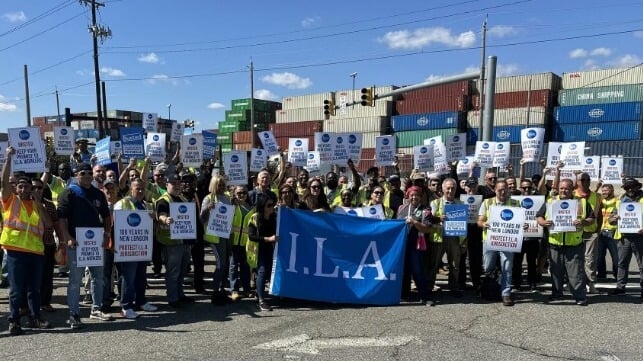Strike Threats Continue to Loom Over U.S. and Canadian Ports

The wave of port labor disputes that has reached from Europe to Australia continues to loom over North America with the U.S. International Longshoremen’s Association starting its two-day strike strategy planning sessions while in Canada the International Longshore Warehouse Union Local 514 has a new mandate for a strike. In the U.S., the union threatens to shut down ports along the East and Gulf coasts while in Canada the dispute is centered on DP World’s West Coast container operations.
The U.S. Maritime Alliance, which represents the terminal operators in the negotiations with the ILA issued a statement on August 30 reporting it has “still been unable to secure a meeting with the ILA to resume negotiations on a new Master Contract.” While not using the word “impasse” the employers are tacitly admitting the lack of progress while saying the organization “continues to meet with its members in preparation for the resumption of negotiations.”
Both the ILA and USMX filed notices with the Federal Mediation & Conciliation Service (FMCS) informing them of the dispute. USMX emphasizes it is not an agreement for mediation.
Today, September 4, the ILA starts two days of meetings with its regional chapters which officially is said to review the wage demands. Media reports indicate the ILA is seeking a 77 percent increase over the life of a six-year contract while it is believed the USMX is closer to the 32 percent given to West Coast dockworkers in their 2023 contract. The ILA has said it will use today and tomorrow to also plan strike strategies while vowing not to go beyond the September 30 contract expiration.
The ILA blames the breakdown in talks on an automation issue dispute at the Port of Mobile and possibly elsewhere. They have said local contracts need to be resolved before the Master Contract.
The National Retail Federation yesterday released a new statement calling on both sides to return to the negotiating table while highlighting the potential consequences of a strike. “At a time when inflation is on the downward trend, a strike or other disruption would significantly impact retailers, consumers, and the economy,” said NRF President and CEO Matthew Shay. “The administration needs to offer any and all support to get the parties back to the table to negotiate a new contract.”
The eastern ports in the U.S. handle 43 percent of the country’s imports according to calculations by CNBC. Shippers have been rerouting some volume toward the West Coast, but major carriers including Maersk have forecast a “serious ripple effect,” if the strike goes forward.
At the same time diversions from east to west could impact the Pacific Coast ports, yesterday in Canada the British Columbia Maritime Employers Association (BCMEA) reported the union has notified it that it now has a strike mandate from members. ILWU Local 514 was forced to take a new strike vote after Canadian regulators in July stopped a prior strike saying it was illegal. The union’s contract covering the forepersons at DP World’s terminals expired in March 2023 with more than 16 months of negotiations not resulting in an agreement.

that matters most
Get the latest maritime news delivered to your inbox daily.
BCMEA emphasized that both sides continue to be involved in a hearing with the Canada Industrial Relations Board (CIRB) regarding the pay and manning proposals for DP World (Canada). BCMEA is charging the union is negotiating in “bad faith.”
Neither the union nor the employers have yet served notice of a job action or lockout. Under Canadian labor law, a 72-hour notice would be required. Both sides are scheduled to continue the CIRB hearing next week.
